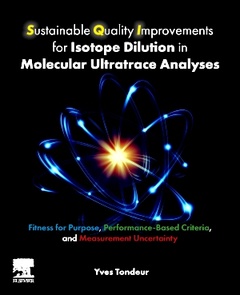Description
Sustainable Quality Improvements for Isotope Dilution in Molecular Ultratrace Analyses
Fitness for Purpose, Performance-Based Criteria, and Measurement Uncertainty
Author: Tondeur Yves
Language: English
Subjects for Sustainable Quality Improvements for Isotope Dilution in...:
Publication date: 04-2024
736 p. · 19x23.4 cm · Paperback
736 p. · 19x23.4 cm · Paperback
Description
/li>Contents
/li>Biography
/li>Comment
/li>
Sustainable Quality Improvements for Isotope Dilution in Molecular Ultratrace Analyses: Fitness for Purpose, Performance-Based Criteria, and Measurement Uncertainty uses a novel Sustainable Quality Improvement (SQI) framework with the aim of helping to re-introduce much needed flexibility and restore accountability and integrity necessary for developing confidence in products obtained with these specialty assays. The book can also be used as a comprehensive reference text for data and information on matrix-specific target analytes detection/quantitation limits, and measurement of uncertainties for planning purposes, congeners profiles, multi-phasic, multi-component and multi-analyte samples processing flow charts, and useful definitions of the underlying technology-relevant terminologies.
The SQI framework around which the book is constructed paves the way for the innovative technological solutions described in the book and is powered by three key elements: Fitness for Purpose (Data Quality Objectives), Performance-Based Measurement System (flexibility, latitude), and Measurement Uncertainty (accountability). Together, they facilitate the development and validation of advanced methodologies to resolve many of the contemporary issues associated with continuously evolving and demanding regulatory requirements. A stronger focus on effective performance feedback is demonstrated to help laboratories rethink their own approach to quality improvements.
The SQI framework around which the book is constructed paves the way for the innovative technological solutions described in the book and is powered by three key elements: Fitness for Purpose (Data Quality Objectives), Performance-Based Measurement System (flexibility, latitude), and Measurement Uncertainty (accountability). Together, they facilitate the development and validation of advanced methodologies to resolve many of the contemporary issues associated with continuously evolving and demanding regulatory requirements. A stronger focus on effective performance feedback is demonstrated to help laboratories rethink their own approach to quality improvements.
1. Spotlight on the Issues
2. The Path to Current Reality
3. Quality Improvement Movements
4 Self-referential principle and enfolded performance concept
5. Quality-Generating Assays
6. Batch Control Spike
7. Performance-Based Criteria Analysis
8. Innovation Platform
9. Revisiting Traditions
10. The right, legal, and correct answers
Appendices
A: Guideposts for core steps
B: Limits of detection (LOD) and quantitation (LOQ)
C: Measurement of uncertainty
D: What’s our focus?
E: Audit samples — Method 301 PLQ — Method 23 final rule
F: Method 1668 validation study
G: New formation mechanism in secondary aluminum smelter
H: Insights into the origin of dioxins in ancient tertiary clays
I: Performance assessment—A vision
J: Method detection limits
K: Artifact and vigilance
L: LOQ validation
M: Percent valley
N: SQI-relevant definitions
O: SQI charts
P: Reference values
References
Reflections pool
2. The Path to Current Reality
3. Quality Improvement Movements
4 Self-referential principle and enfolded performance concept
5. Quality-Generating Assays
6. Batch Control Spike
7. Performance-Based Criteria Analysis
8. Innovation Platform
9. Revisiting Traditions
10. The right, legal, and correct answers
Appendices
A: Guideposts for core steps
B: Limits of detection (LOD) and quantitation (LOQ)
C: Measurement of uncertainty
D: What’s our focus?
E: Audit samples — Method 301 PLQ — Method 23 final rule
F: Method 1668 validation study
G: New formation mechanism in secondary aluminum smelter
H: Insights into the origin of dioxins in ancient tertiary clays
I: Performance assessment—A vision
J: Method detection limits
K: Artifact and vigilance
L: LOQ validation
M: Percent valley
N: SQI-relevant definitions
O: SQI charts
P: Reference values
References
Reflections pool
Yves Tondeur is the Founder and CEO of It’s About Purpose, LLC, based in the USA. He graduated from the Free University of Brussels with a Ph.D. in Chemistry. Post-doctoral research work in the field of analytical organic mass spectrometry entailed the applications of negative chemical ionization mass spectrometry to trace analyses of chlorinated aromatic compounds, interfacing the sample preparation and mass spectrometry laboratories while developing and optimizing analytical procedures for substances of concern. He developed the original version of USEPA Method 8290 in support of the Superfund Program before rejoining a group of former scientists and colleagues who founded a commercial laboratory. He consistently and determinatively promoted the benefits of isotope dilution for measuring trace levels of toxic compounds, refined the original version of Method 8290 leading to the analytical portion of Method 23 for stack emissions, and Method 1613. During his tenure at Analytical Perspectives, efforts toward improvements in methodologies continued with a special emphasis on understanding the technology, how it differentiates itself from older methods and other technologies, and how a genuine performance-based approach could be materialized.
- Aims to bring back a more scientific approach and critical thinking in the use of crucial isotope dilution techniques in analytical labs
- Provides an extensive introduction of Sustainable Quality Improvements (SQI) frameworks as a new paradigm to chemical analysis challenges
- Pushes the reader to think outside the box by presenting creative and innovative ways to handle QA/QC in a challenging environment where analytical laboratory results have a huge impact on decision-makers
© 2024 LAVOISIER S.A.S.




